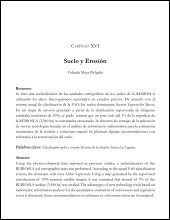Humatos de vermicompost como mitigador de la salinidad en albahaca (Ocimum basilicum L.)
Author
JUAN JOSE REYES PEREZ
BERNARDO MURILLO AMADOR
ALEJANDRA NIETO GARIBAY
ENRIQUE TROYO DIEGUEZ
EDGAR OMAR RUEDA PUENTE
Metadata
Show full item recordAbstract
"Los bioestimulantes del crecimiento son sustancias que actúan como activadores fisiológicos, absorción de nutrientes y mitigan el estrés salino. El objetivo fue evaluar humatos de vermicompost como atenuantes del efecto de la salinidad en la emergencia y crecimiento de albahaca (Ocimum basilicum L.). El diseño experimental fue completamente al azar con arreglo factorial, cuyos factores fueron variedades de albahaca (Napoletano y Sweet Genovese), concentraciones de NaCl (0, 50 y 100 mM) y humatos de vermicompost (0 y 1/60 v/v) con seis repeticiones. Se realizaron análisis de varianza y comparaciones independientes de medias (p ≤ 0,05). El experimento se realizó en 2013 en La Paz, México. Se midió el porcentaje y tasa de emergencia, longitud de radícula, altura de plántula, biomasa fresca y seca de radícula y de parte aérea. Se encontraron diferencias significativas para todas las variables (p ≤ 0 ,05), mostrando respuesta diferencial entre variedades para tasa, porcentaje de emergencia y variables morfométricas, destacando la variedad Napoletano con aplicación del bioestimulante como el tratamiento con mejores resultados. El uso de humatos estimuló todas las variables en condiciones de salinidad, permitiendo que la variedad tolerante mejore su emergencia y crecimiento y la variedad sensible incremente su tolerancia al estrés salino." "Bioestimulants of the growth are substances that act as activators of the physiology, absorption of nutrients and to mitigate the stress of salinity. The objective was to evaluate humates of vermicompost as attenuating of the salinity in the emergence and growth of basil (Ocimum basilicum L.). The experimental design was completely randomized with factorial arrangement whose factors were basil varieties (Napoletano and Sweet Genovese), concentrations of NaCl (0.50 and 100 mM) and humates of vermicompost (0 and 1/60 v/v) with six replications. Variance analysis and independent comparisons of means (p ≤ 0.05) were done. The experiment was carried out in 2013 in La Paz, Mexico. The percentage and emergency rate, radicle length, seedling height, fresh and dry biomass of radicle and aerial part were measured. Significant differences were found for all variables (p ≤ 0.05), showing differential response among varieties for emergence rate, emergence percentage and morphometric variables, highlighting the variety Napoletano with biostimulant application as treatment with better results. The humates stimulated all variables under saline conditions, allowing that the tolerant variety improves its emergence and growth and the sensitive variety increases its tolerance to the saline stress."
Collections
Related items
Showing items related by title, author, creator and subject.
-
PROMOCIÓN DEL PERIFITON PARA EL CULTIVO DE CAMARÓN BLANCO: HACIA UNA ACUICULTURA ECOLÓGICA
DOMENICO VOLTOLINA LOBINA; JUAN MANUEL AUDELO NARANJO; MARIA DEL ROSARIO PACHECO MARGES -
Suelo y Erosión
YOLANDA LOURDES MAYA DELGADO


